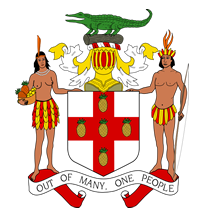The island - discovered by Christopher COLUMBUS in 1494 - was settled by the Spanish early in the 16th century. The native Taino, who had inhabited Jamaica for centuries, were gradually exterminated and replaced by African slaves. England seized the island in 1655 and established a plantation economy based on sugar, cocoa, and coffee. The abolition of slavery in 1834 freed a quarter million slaves, many of whom became small farmers. Jamaica gradually increased its independence from Britain. In 1958 it joined other British Caribbean colonies in forming the Federation of the West Indies. Jamaica gained full independence when it withdrew from the Federation in 1962. Deteriorating economic conditions during the 1970s led to recurrent violence as rival gangs affiliated with the major political parties evolved into powerful organized crime networks involved in international drug smuggling and money laundering. Violent crime, drug trafficking, and poverty pose significant challenges to the government today. Nonetheless, many rural and resort areas remain relatively safe and contribute substantially to the economy.
Jamaica is a parliamentary democracy under a constitutional monarchy and part of the Commonwealth realm.
Members:
Resources
Displaying 36 - 40 of 77Bodies Corporate (Joint Tenancy) Act.
This Act provides defines certain rights of bodies corporate in respect of property. A body corporate shall be capable of acquiring and holding any real or personal property in joint tenancy in the same manner as if it were an individual but the acquisition and holding of property by a body corporate in joint tenancy shall be subject to the like conditions and restrictions as attach to the acquisition and holding of property by a body corporate in severalty.
Public Gardens Regulation Act.
This Act provides for the management of public gardens, i.e. any land vested in the Commissioner of Lands, and designated by him or any entity acting on his behalf for use as public garden. It also prohibits various activities in such gardens and provides for seizure and impounding of stray animals. prohibited activities include: picking of fruits, plants or flowers; destroying of trees; and injuring of animals.
Loans to Small Business Act.
This Act establishes the Small Businesses Loan Board and provides for loans by the Board to small businesses.The Board shall assist persons in establishing, carrying on or expanding small businesses by providing loans and other forms of financial assistance at such conditions and on the basis of any form of security as the Board may think fit.
Law Reform (Protection and Enforcement of Public Rights) Act.
This Act stipulates that, notwithstanding any provision in any enactment or any rule of law, a person may, in the public interest and without the consent of the Attorney-General, make an application to the Supreme Court for the protection and enforcement of public rights. Such application shall not be made unless leave of the Supreme Court has been obtained in accordance with rules of court; and the Court shall not grant leave to make such an application unless it considers that the applicant has a sufficient interest in the matter to which the application relates.
Urban Development Corporation Act.
This Act establishes the Urban Development Corporation, defines its functions and powers and provides for its administration and functioning.The Corporation shall be responsible for the laying out and development of areas designated by the Minister under this Act. The Corporation may acquire land in accordance with the Land Acquisition Act. The Act also concerns the sale or lease of any land vested in the Corporation, the development of water supply and sewerage services and the relationship between the Corporation and Statutory Undertakers.


